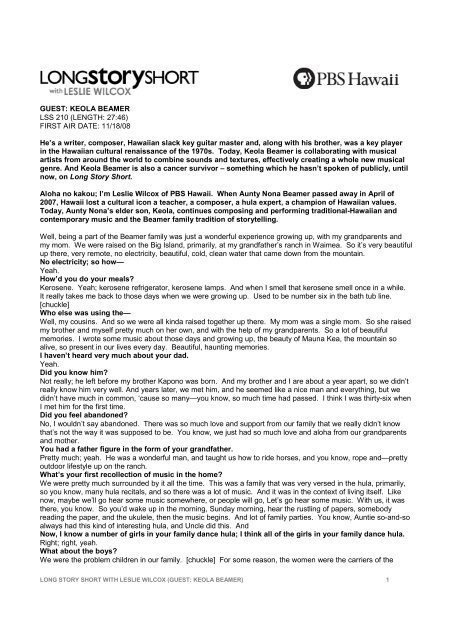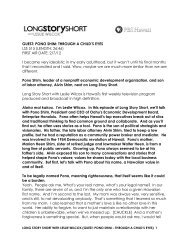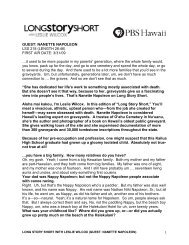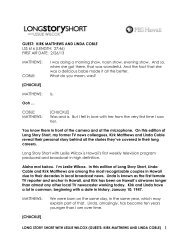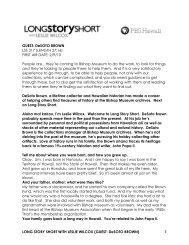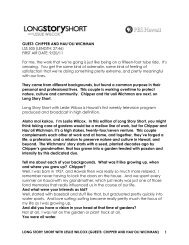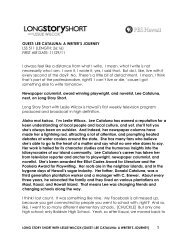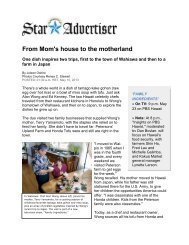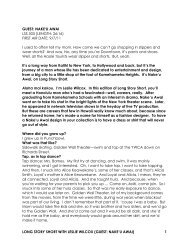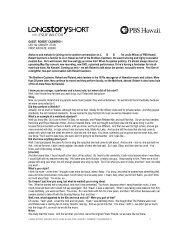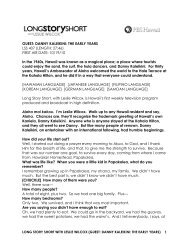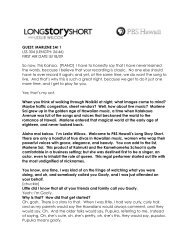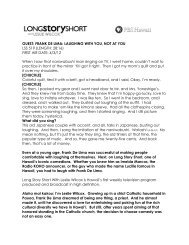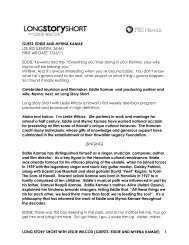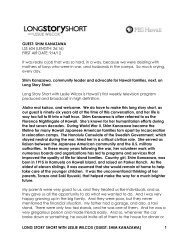GUEST: KEOLA BEAMER LSS 210 (LENGTH: 27:46 ... - PBS Hawaii
GUEST: KEOLA BEAMER LSS 210 (LENGTH: 27:46 ... - PBS Hawaii
GUEST: KEOLA BEAMER LSS 210 (LENGTH: 27:46 ... - PBS Hawaii
Create successful ePaper yourself
Turn your PDF publications into a flip-book with our unique Google optimized e-Paper software.
<strong>GUEST</strong>: <strong>KEOLA</strong> <strong>BEAMER</strong><br />
<strong>LSS</strong> <strong>210</strong> (<strong>LENGTH</strong>: <strong>27</strong>:<strong>46</strong>)<br />
FIRST AIR DATE: 11/18/08<br />
He’s a writer, composer, <strong>Hawaii</strong>an slack key guitar master and, along with his brother, was a key player<br />
in the <strong>Hawaii</strong>an cultural renaissance of the 1970s. Today, Keola Beamer is collaborating with musical<br />
artists from around the world to combine sounds and textures, effectively creating a whole new musical<br />
genre. And Keola Beamer is also a cancer survivor – something which he hasn’t spoken of publicly, until<br />
now, on Long Story Short.<br />
Aloha no kakou; I’m Leslie Wilcox of <strong>PBS</strong> <strong>Hawaii</strong>. When Aunty Nona Beamer passed away in April of<br />
2007, <strong>Hawaii</strong> lost a cultural icon a teacher, a composer, a hula expert, a champion of <strong>Hawaii</strong>an values.<br />
Today, Aunty Nona’s elder son, Keola, continues composing and performing traditional-<strong>Hawaii</strong>an and<br />
contemporary music and the Beamer family tradition of storytelling.<br />
Well, being a part of the Beamer family was just a wonderful experience growing up, with my grandparents and<br />
my mom. We were raised on the Big Island, primarily, at my grandfather’s ranch in Waimea. So it’s very beautiful<br />
up there, very remote, no electricity, beautiful, cold, clean water that came down from the mountain.<br />
No electricity; so how—<br />
Yeah.<br />
How’d you do your meals?<br />
Kerosene. Yeah; kerosene refrigerator, kerosene lamps. And when I smell that kerosene smell once in a while.<br />
It really takes me back to those days when we were growing up. Used to be number six in the bath tub line.<br />
[chuckle]<br />
Who else was using the—<br />
Well, my cousins. And so we were all kinda raised together up there. My mom was a single mom. So she raised<br />
my brother and myself pretty much on her own, and with the help of my grandparents. So a lot of beautiful<br />
memories. I wrote some music about those days and growing up, the beauty of Mauna Kea, the mountain so<br />
alive, so present in our lives every day. Beautiful, haunting memories.<br />
I haven’t heard very much about your dad.<br />
Yeah.<br />
Did you know him?<br />
Not really; he left before my brother Kapono was born. And my brother and I are about a year apart, so we didn’t<br />
really know him very well. And years later, we met him, and he seemed like a nice man and everything, but we<br />
didn’t have much in common, ‘cause so many—you know, so much time had passed. I think I was thirty-six when<br />
I met him for the first time.<br />
Did you feel abandoned?<br />
No, I wouldn’t say abandoned. There was so much love and support from our family that we really didn’t know<br />
that’s not the way it was supposed to be. You know, we just had so much love and aloha from our grandparents<br />
and mother.<br />
You had a father figure in the form of your grandfather.<br />
Pretty much; yeah. He was a wonderful man, and taught us how to ride horses, and you know, rope and—pretty<br />
outdoor lifestyle up on the ranch.<br />
What’s your first recollection of music in the home?<br />
We were pretty much surrounded by it all the time. This was a family that was very versed in the hula, primarily,<br />
so you know, many hula recitals, and so there was a lot of music. And it was in the context of living itself. Like<br />
now, maybe we’ll go hear some music somewhere, or people will go, Let’s go hear some music. With us, it was<br />
there, you know. So you’d wake up in the morning, Sunday morning, hear the rustling of papers, somebody<br />
reading the paper, and the ukulele, then the music begins. And lot of family parties. You know, Auntie so-and-so<br />
always had this kind of interesting hula, and Uncle did this. And<br />
Now, I know a number of girls in your family dance hula; I think all of the girls in your family dance hula.<br />
Right; right, yeah.<br />
What about the boys?<br />
We were the problem children in our family. [chuckle] For some reason, the women were the carriers of the<br />
LONG STORY SHORT WITH LESLIE WILCOX (<strong>GUEST</strong>: <strong>KEOLA</strong> <strong>BEAMER</strong>) 1
culture, dating back many, many years and many generations. My great-grandmother, Helen Desha Beamer,<br />
had to teach hula in secret, because you know, it was frowned on back in her day.<br />
And she was also a prolific songwriter.<br />
Oh, beautiful composer, wonderful artist. Sometimes I feel my own work doesn’t even come close to touching<br />
the hem of her skirt. She was amazing.<br />
Did you work with her on any music?<br />
No; because she died when I was about a year old. So I didn’t have that chance.<br />
But you grew up hearing her music because it was kept alive in the family.<br />
Yes; and still is. Yeah. She’s revered in our family.<br />
How much did your mom influence you in music?<br />
Quite a bit. And I’m amazed at how often over the years we were more than just mother and son; we were<br />
collaborators and best friends. And kupuna and haumana, and so I’d often consult her on the smallest detail of a<br />
song. You know, sometimes it’s kauna, the double meaning of things. So it’s not surface as it first might appear.<br />
So you need that kind of undercurrent of knowledge in culture in order to really interpret the work and understand<br />
that. We believe, as the Beamer ohana, that you really should try to follow the intent of the composer. You know,<br />
what does the song real—what is the composer trying to do, what is the composer trying to say. And by following<br />
that intent, you are often led in some very interesting and beautiful directions.<br />
Which frees you to change the music?<br />
Frees you to interpret it in a pono way, with a heart that feels like you’re doing the right thing with it.<br />
Keola Beamer has shown that he understands intention, composition and culture. He’s written and<br />
arranged traditional and contemporary songs, published a book of short stories and begun exploring and<br />
creating a new, collaborative, musical genre. In the late 1970s, Keola collaborated with his brother,<br />
Kapono Beamer, writing and recording music on the leading edge of what became known as the <strong>Hawaii</strong>an<br />
cultural renaissance.<br />
The time was right. You know, it was the renaissance of <strong>Hawaii</strong>an music, is the way it’s referred to now, where<br />
kids, all of a sudden, they were proud to be <strong>Hawaii</strong>an. Me too, you know. Maybe before that, not so proud to be<br />
<strong>Hawaii</strong>an. But the music helped us remember that, you know, we had something to say, and it was important,<br />
and so groups like Country Comfort, and C&K, and in those days, Sunday Manoa, Olomana—you know, this<br />
music was fresh, and it was being created by our feelings, our relations to the world at that time, and it really<br />
struck a chord with the young people in <strong>Hawaii</strong>.<br />
Before you and your younger brother, Kapono were performing at Territorial Tavern—<br />
Yeah.<br />
--I imagine you’d done music together informally most of your lives. What was your relationship like?<br />
Did you try to boss him around, or was he the smart-alecky younger brother? What stereotype applies,<br />
if any?<br />
[chuckle] Thank you for that question.<br />
[chuckle]<br />
Yeah; nothing like stereotypes.<br />
[chuckle]<br />
I don’t know. I guess I was kind of the leader, I guess, being the older brother, and stuff. And you know, we<br />
did a lot of things. There was a lot of pressure. And you know, there’s two types in the music business when<br />
it’s difficult. Lack of success and tremendous success; and both those things are fraught with complication.<br />
But for the most part, you know, we had a nice run, had a great time; enjoyed it.<br />
And I’m sure you hear all the time, ‘Gee, you have a wonderful solo career.’ ‘So, does your brother…’<br />
‘But I wish you folks would play together sometimes.’<br />
Yeah. It’s yeah, kinda like—the way I would put it is we never lost our love for each other. I mean, we are blood<br />
brothers and we love each other. But we lost our love of working together. And in this business in particular, you<br />
have to love it. Because then you just if you don’t love it, it’s work. You know, if you love it, it’s not work. And the<br />
best music comes from love. We were just tired of the idea of working together. And personally, too, it seems,<br />
you don’t have a lot in common, even though you love each other. We’re different human beings, and that’s okay.<br />
You know, that’s fair. We don’t all have to be alike in this world, so you know, we try to make space for that.<br />
I’m sure you knew I would ask you about this. Do you get tired of it? Because I’m sure a lot of people ask<br />
you, or you know, they’re thinking about it.<br />
Yeah; I get tired of it. I mean, it’s been a lot of years,<br />
But I’m sure you relate to Cecilio and Kapono, in that sense.<br />
Yeah; and Robert and Roland. But I’ve been in the business so long, where I know that these projects are like<br />
LONG STORY SHORT WITH LESLIE WILCOX (<strong>GUEST</strong>: <strong>KEOLA</strong> <strong>BEAMER</strong>) 2
stepping stones. You know, you do one, and then you work very hard, and you do another. But what is really<br />
interesting is the water that runs between the stones, the wonderful things that music brings into your life, the<br />
great places where you can go because of the music. Music brings people together, and makes beautiful<br />
experiences. So it’s often not the business of music that’s anything interesting to me; it’s what happens between<br />
the business and music.<br />
You know, you’re such a wonderful musician, but you’re also very good with words. And of course,<br />
you’re a writer; you’ve done a book of short stories. What are some of the artistic expressions and ways<br />
you express yourself creatively?<br />
I think for me, there’s an interesting <strong>Hawaii</strong>an word; kuana ‘ike. It means cultural paradigm, yeah? So I sort of<br />
view the world through a <strong>Hawaii</strong>an cultural paradigm. It was a gift from my ohana, right? So I may see things a<br />
little differently than somebody else with a different paradigm may see something. So I find it’s a really interesting<br />
world view. I’ve been exploring Buddhism lately, because I’ve seen many parallels between Buddhism and our<br />
<strong>Hawaii</strong>an culture, and for instance, the idea of a <strong>Hawaii</strong>an sort of philosophical thought is that within each<br />
individual, there is a bowl of light, a beautiful bowl of light. And in Buddhism, that may be called Buddhist nature.<br />
There’s a Buddhist nature in each human being, there’s a bowl of light in each human being. And you can<br />
extinguish that light, or dim it by placing in the stones of aggression, anger, ignorance; and the light dims. And in<br />
Buddhism, that may be called, perhaps, bad karma, you know sometimes they call it the three poisons, anger,<br />
greed. The idea that Buddhism embraces other cultures, other religions even, and that we should have<br />
compassion for one another; we call that aloha. So I find that really sort of interesting common grounds between<br />
the two, and that’s why I kinda want to learn more about it, and study it more. Because I find that an interesting<br />
way to view the world, and a very helpful way.<br />
Would you say you are a Buddhist?<br />
Yes. Yeah.<br />
And that’s just in the last couple of years?<br />
Yeah. Like everything else, music brought that to me, where I played for the floating lantern festival two years<br />
ago, and as I sat there with the Buddhist priests, and I understand—you know, I began to understand their<br />
reverence for ancestors—same like ours, yeah, in the <strong>Hawaii</strong>an culture. And I realized, you know, what wonderful<br />
and interesting people they were. It wasn’t like a gig at all. You know, I thought I was just gonna play a gig, but it<br />
wasn’t. It was a very moving experience. And then this year, I floated a lantern for my own mother. I wasn’t<br />
anticipating that would happen. But that’s life, you know, so I lost my mom, and I put that lantern out in the ocean,<br />
and watched it disappear.<br />
Here’s a quote attributed to Buddha: “Thousands of candles can be lighted from a single candle, and the<br />
life of the candle will not be shortened. Happiness never decreases by being shared.” When we invited<br />
Keola Beamer to join us for a conversation on Long Story Short, he said he wanted to speak publicly, for<br />
the first time, about his personal battle with prostate cancer. And he said he might be ready to speak<br />
openly, for the first time, about the passing of his mother, Aunty Nona Beamer.<br />
As we speak, it’s been a few months.<br />
Right.<br />
And I know you go through different stages of grief. What are your thoughts now, six months after she<br />
passed?<br />
Yeah. Well, it’s very—I’ve not known grief like that in my life. I didn’t know that that was possible to love<br />
somebody so much, and then they’re gone. But the grief sort of reminds me a little bit of when I was a young<br />
man, surfing, and you’d sit out there on your surfboard, and everything would be okay, and then this set would<br />
come in these big, towering waves. And grief is like that; you’re doing pretty good, and then the grief comes in, in<br />
waves, and you do your best and you deal with it. And then another set comes, and this continues for a while,<br />
you know. Because my mom was a revered <strong>Hawaii</strong>an cultural treasure, she touched many lives. And we as<br />
Beamers have to have the compassion for other people’s grief too; not just our own.<br />
Hard to take care of them, when you’ve gotta take care of yourself too.<br />
Yeah. That’s difficult. But we can do it. We have done it. My mom led a life that made a difference in the world;<br />
she made the world a better place. She touched thousands of lives and helped many, many students, and she<br />
left with dignity. How great, you know. I’d be so happy if that happened in my own life. I want to share a story<br />
with you that means quite a lot to me. The morning of her passage, Moana, my wife and I were in San Francisco.<br />
And I had this very powerful dream, and it was young woman, a beautiful young woman, vibrant, beautiful black<br />
hair. Just this unbelievable energy. And you also had the feeling with this woman in my dream, that she was a<br />
person to be reckoned with. You know. And I almost didn’t recognize her, but it was my mom. And she had just<br />
come to say goodbye.<br />
LONG STORY SHORT WITH LESLIE WILCOX (<strong>GUEST</strong>: <strong>KEOLA</strong> <strong>BEAMER</strong>) 3
Did you recognize that at the time, that she was saying goodbye, or did you figure it out later?<br />
Figured it out a little bit later. I almost didn’t recognize her, because I was used to taking care of my kupuna mom,<br />
right, with the thin arms and the graying hair. But this woman was my mom, before my brother and I were born.<br />
And she was beautiful and vibrant; and the word that comes to mind is, joy. She was joyous. She had<br />
transcended the cocoon of old age.<br />
M-hm. M-m. You know, speaking of passing. You had a health situation which probably caused you to<br />
think of the possibility of you passing.<br />
Right.<br />
And people don’t realize that you had prostate cancer.<br />
Yes; about five years ago, I was diagnosed with prostate cancer. That was a difficult time in our lives. Yeah;<br />
you’re just going along, everything seems fine, and having a great life, and all of a sudden, boom, you know.<br />
Sitting in the doctor’s office, and you hear the word cancer, and it’s about you. You know. In a way, we kind of<br />
have a saying, my friends and I; it’s an old Pidgin saying called, NCH. No can handle. You know, so when you<br />
hear that, it’s very close to NCH, you know.<br />
M-hm.<br />
You kind of—I found myself kind of disappearing and looking from a distance, down at the doctor and myself, and<br />
he’s telling me this stuff. So in a, you know, in a very interesting way, this shapes your life to brush against your<br />
own mortality—helps you realize what is important, and what is not. You know. I found myself really appreciating<br />
things like sunlight, about—I found myself wanting to be with my wife, wanting to be with my friends. It wasn’t<br />
about wanting to go the office and do some music, licensing or something. [chuckle] But it was more about being<br />
with the people you love, and the ocean, and the sun. And I think that, for people that you know, have this kind of<br />
challenge in their lives, I think it’s important to try to stay positive. Because you know, this sort of idea of cancer<br />
places this matrix of fear over our lives. I think most cancer survivors and cancer patients know that fear. And we<br />
have to kind of rise above that, because you know, there’s still life, and there’s still joy, and there’s still a future if<br />
you’re, you know, lucky enough to catch it when it’s—in the early stages of development, which was my case.<br />
Yeah. So I’m kinda fine now. In five years everything seems to be working properly, and happily enjoying my life.<br />
Medical technology is amazing.<br />
Listening to you just now, I thought of something your mother said to me when we talked a few weeks<br />
before she passed away. She said that she’d just come out of a major health scare previously, and she<br />
said, There’s nothing like going through that to just wipe away any pettiness—any small stuff in your life.<br />
Yeah; yeah.<br />
It’s gone.<br />
Yeah; exactly. You know, you’ve heard the—I’ve heard this before, that cancer is a blessing. I remember the first<br />
time I ever heard that; I said, What kind of BS is that? How can cancer possibly be a blessing? But in actuality, it<br />
was for my life. I know that sounds so strange, and so counterintuitive.<br />
Well, what do you do now differently, that you didn’t, or wouldn’t have done then?<br />
It just kind of cleared away the detritus of my life. You know, it made me realize, you know, it’s so—I used to feel<br />
so guilty if I said no about playing a gig that I didn’t really want to do. You know, I’d just feel so, oh person wants<br />
me; oh, guilt, guilt. But now, I just say, you know, I’m sorry. It’s not what I want to do.<br />
Life is short and—<br />
Yeah.<br />
--you’ve gotta focus.<br />
Right. So I think I’ll choose the things that I love now, and be a little bit more, you know, happy to do that,<br />
Another saying associated with Buddha: “The secret of health for both mind and body is not to mourn for<br />
the past, nor to worry about the future, but to live the present moment wisely and earnestly.” Speaking of<br />
quotes, I asked Keola about one I found that’s attributed to him.<br />
There’s this wonderful quote; I have to ask you if it’s true, because it just makes me laugh. You, after<br />
some experiences playing in hotels and having people expect the kinda music that you really didn’t want<br />
to play, you said, Let’s see. You encourage tourists to ask about slack key; there are festivals several<br />
times during the year, usually for free in public parks. Write on your guest comment card, I would like to<br />
hear some real <strong>Hawaii</strong>an slack key guitar in this hotel. Say no to tourist pabulum. If someone plays<br />
Sweet Leilani at the restaurant, blow chunks and eggs at the premises. Change the world. Did you say<br />
that?<br />
[chuckle] I think so.<br />
[chuckle]<br />
You—don’t—I don’t. I’m sorry. I apologize for the humor of that. You know—<br />
LONG STORY SHORT WITH LESLIE WILCOX (<strong>GUEST</strong>: <strong>KEOLA</strong> <strong>BEAMER</strong>) 4
Don’t apologize; it’s funny.<br />
It’s basically a situation of kind of trying to create more knowledge about the <strong>Hawaii</strong>an culture, and about its<br />
music. For many years, people thought the <strong>Hawaii</strong>an slack key guitar and the steel guitar were the same thing.<br />
You know. So we’d, you know, when people said, What kind of guitar do you play? Oh, is that nrr-nrr one? No,<br />
it’s not. You know, two different things.<br />
And it’s chicken and the egg. If <strong>Hawaii</strong>an musicians present this music, why shouldn’t tourists think that<br />
that’s what it is?<br />
Right. Right; exactly. Yeah.<br />
I know you’ve had arguments with others, say, in slack key—<br />
Sure; sure.<br />
--guitar, about how much innovation there should be. I mean—<br />
Right.<br />
--do you keep it pristine, just as it was, or do you add your own touch? What’s the answer?<br />
Well, that is an argument that has continued through the years; similarly, in blues or other forms of music. There<br />
are the traditionalists who really—I play the way I was taught, that’s just the thumb, and the index finger, and<br />
that’s it, that’s it. I personally am old enough to have met Auntie Alice Namakelua; I was one of her students.<br />
And she thought that the next generation—Uncle Ray and Gabby, she thought those guys were radical. Those<br />
guys were putting in jazz chords and stuff. She goes, Tchah! That’s not the way, you know.<br />
So she thought Raymond Kane would be a radical. But do you consider him a radical? Aren’t you the<br />
radical?<br />
Yeah; I guess I would not consider Uncle Ray a radical. You know, he was kind of a traditionalist. But to her<br />
ears, yeah?<br />
M-hm.<br />
She had that definite pattern that she was taught by her brother, and that was what slack key should sound like.<br />
Didn’t have all these kind of interesting chords that you know, came in later. And so I think that as artists and<br />
human beings, you know, I am not a museum piece; you know, life changes, and language changes, and tastes<br />
change. So we try to respect the music of our kupuna, and love it, and cherish it, and remember them. We<br />
remember them by their tunings, what they played. Without them, you know, these beautiful shoulders to stand<br />
upon, our way would have been much, much more difficult, you know. So we revere them, we appreciate them;<br />
Uncle Ray, Gabby, awesome people, beautiful musicians. By the same token, we have our own DNA and our<br />
own musical ideas, and we should be allowed to express them, yeah.<br />
Are there things going on with <strong>Hawaii</strong>an slack key now, ki ho’alu, that you don’t really appreciate?<br />
I think there’s been an over-commercialization of it to a certain extent. You know, because it has been<br />
successful. I don’t really spend much time thinking about that kinda stuff, but prefer to go on my own path.<br />
M-hm.<br />
I think the idea is that artists can sort of transcend boundaries, yeah? We can hopefully, with language of music,<br />
this beautiful inclusive language of music, we can work together in creating a global village and make the world a<br />
better place. You know. Make it a more interesting place. Tear down some boundaries between human beings,<br />
you know. So the idea is that we can transcend these boundaries through music if we work hard at it, in<br />
collaboration, working with each other. I’ve learned a lot about collaboration over the years. I’ve done a number<br />
of projects that have been fascinating to me.<br />
Eclectic.<br />
Eclectic would be a very good word. I did a project—I think it was the year before last, in Amsterdam, with a<br />
Javanese gamelan orchestra. And those guys don’t even have a Western scale. You know, so it was interesting<br />
to try to combine the elements that we have in <strong>Hawaii</strong>an music with the Indonesian elements, and then create a<br />
new piece, which is essentially a new sound, never existed before. Likewise, I’ve been blessed to work with<br />
musicians from Europe, from Asia, trying different ideas.<br />
Do you find that people are open, or do they know what they like as soon as they hear it, or they don’t like<br />
it? Do people give it a chance?<br />
They do. Yeah; they do. This, you know, eclectic music that I’ve been involved with; very strange, very different,<br />
not your commercial path; but people—yeah, it’s interesting. It’s different, it’s interesting.<br />
And you learn a lot about other people’s cultures as well.<br />
Oh, absolutely. It’s an interesting journey to try and collaborate, create something different that never existed<br />
before.<br />
It’ll be revealing to see (and hear) what comes of Keola Beamer’s collaborations with musicians from<br />
other cultures just as it’s revealing to hear him speak about joy and blessings juxtaposed with stories<br />
of grief coming in towering waves. Stories like these, that reveal character and life choices, have great<br />
LONG STORY SHORT WITH LESLIE WILCOX (<strong>GUEST</strong>: <strong>KEOLA</strong> <strong>BEAMER</strong>) 5
value and we so enjoy them bringing to you on this program. At <strong>PBS</strong> <strong>Hawaii</strong>, our mission is to inform,<br />
inspire and entertain; and we try to do that each week on Long Story Short. Mahalo to Keola Beamer for<br />
sharing with all of us. I’m Leslie Wilcox of <strong>PBS</strong> <strong>Hawaii</strong>. A hui hou kakou.<br />
Video clip with production credits:<br />
Do you think you’ll see your mother again?<br />
Yes; yes, I do. I feel pretty confident about that. And my grandparents, and …<br />
What are you gonna say when you see them?<br />
Howzit?<br />
[chuckle] Eh!<br />
[chuckle]<br />
[chuckle]<br />
LONG STORY SHORT WITH LESLIE WILCOX (<strong>GUEST</strong>: <strong>KEOLA</strong> <strong>BEAMER</strong>) 6


